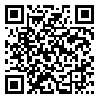BibTeX | RIS | EndNote | Medlars | ProCite | Reference Manager | RefWorks
Send citation to:
URL: http://rjms.iums.ac.ir/article-1-2352-en.html
Background : Blood is the third component of the circulatory system where changes occur following exercise-induced increase in metabolism. The purpose of the present research was to examine the effect of time of performing a maximal aerobic exercise session on granulocyte serum changes in young male athletes.
Methods: Twenty athletes were randomly selected from the students of Physical Education in the University of Tehran and were divided into a morning group (N=10 20.9±0.99 years, 67.35±6.27 kg, and 180.4±4.28 cm) and an afternoon group (N=10 21±0.63 years, 67.13±9.13 kg, and 176.9±9.01 cm).The morning and afternoon groups performed the seven-station Bruce protocol from 8 to 10 A.M. and 3 to 5 P.M., respectively. The present research is quasi-experimental with a pretest-posttest design. Blood samples were collected from both groups before, immediately after, and 2 hours after the exercise. Mean and standard deviation were used for data description, and repeated measures ANOVA as well as Bonferroni test were applied for hypothesis testing at the 0.05 significance level.
Results: The result suggested that during a maximal aerobic exercise session in morning and afternoon neutrophil levels in the two groups decreased in post-test compared pre-test and in the recovery increased to a higher rate than the pre-test. Lymphocyte levels in the two groups increased compared to pre-test and in the recovery test was lower than before. Monocyte and eosinophil levels in three stages declined. On the other hand, no significant differences were noted in the neutrophil and lymphocyte levels in both morning and afternoon and monocytes in the morning group.
No significant differences were noted in the levels of eosinophils and monocytes of the groups at different stages of blood sampling. Only there was a significant difference between neutrophil levels in male athletes during maximal aerobic exercise session in the morning and afternoon, before, immediately and 2 hours after the activities (p≤0/05).
Conclusion: Based on the results of the research, it can be argued that a maximal aerobic exercise session is considered as a stress and repressive factor for the immune system.





